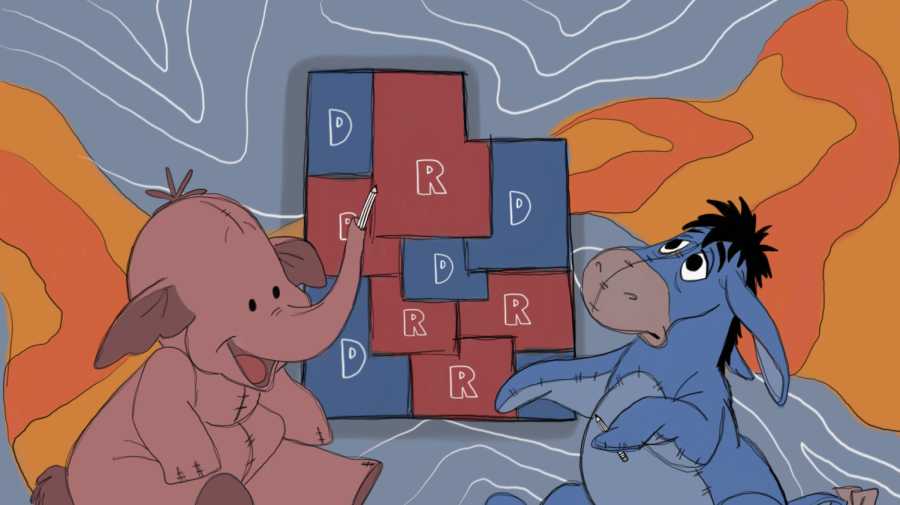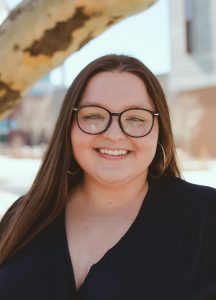Edwards & Shadley: Building Better Boundaries
(Graphic by Storey McDonald | The Daily Utah Chronicle)
November 30, 2021
Against the wishes of the Salt Lake community, Utah Republicans have chosen to prioritize their job security over genuine representation. Utahns voted for an independent commission to redraw our political boundaries without conflicting interests, but our legislators refused to implement those maps. By spreading the county over the state’s four congressional districts, the legislature’s act diluted Salt Lake County residents’ political power and ensured Republican domination for years to come.
Our anti-democratic constitution effectively requires Utah legislators to approve any state-level changes to the redistricting process. Meaning, we will never have the representation we deserve because it would require those legislators to vote against their own interests. And weak propositions that barely pass aren’t going to restrain them. Therein lies the unsolvable problem. The Utah State Legislature isn’t accountable to the people they ostensibly represent, leaving any change dependent on national solutions that aren’t likely to pass any time soon.
That sucks.
It’s easy to become disillusioned after Prop 4 didn’t give us the better boundaries we were promised. It’s easy to throw our hands up and hope someone else will figure it out. But imagining a world where our legislators gave a damn or the political stars aligned to pass the perfect gerrymandering reform isn’t activism — it’s policy wonking. And nothing will change until we ditch those disconnected solutions for community-driven movements.
The Legislature Deprives Salt Lake of an Advocate
Salt Lake is undeniably progressive. An actual representative of Salt Lake would support radical liberal policies like a $10 minimum wage, the Civil Rights Act, insulin under $100, gay marriage, buses, a weekend, suffrage and taxes.
Instead, Salt Lake has to beg Burgess Owens, John Curtis, Chris Stewart and Blake Moore to acknowledge our existence. Time and time again, they deny our basic needs. We make our phone calls, write our strongly-worded op-eds and rally behind Prop 4, expecting that this time they’ll be better.
They’re not.
Federal representation isn’t just symbolic. It affects people’s survival. While those op-eds (including this one) are written, people who depend on federal assistance watch their representatives downplay and discredit their needs. Massive national spending forces congressional representatives to lobby on behalf of their district in the drafting process. When our representatives aren’t accountable to us, they don’t fight for the resources that the government could provide Salt Lake. Resources we desperately need. Not having an advocate leaves Salt Lake’s most vulnerable high and dry.
Propositions and Institutional Reforms Aren’t Enough
No technocratic solution — not a proposition, white paper, algorithm, poll, conference, think tank or lawsuit — has secured the long-term change we need. We already have an onslaught of proposals at every level of government to end gerrymandering once and for all. H.R. 1 has been around for almost three years at this point, but a bill stalled in the Senate doesn’t improve anyone’s situation. Sure, we need something to organize around, but real change comes from a social movement that realizes legislation is a means to an end.
That end cannot be a political system. A democratic political system can only facilitate deliberation and action within a political community. It can only be a tool for movements that have already been built. It cannot prescribe the substance of those movements. That must come from the people.
Political leaders harm our community when they suggest that Prop 4 or “Better Boundaries” will magically solve all of our problems. When we take their advice, we organize around Prop 4. Even when we succeed, those campaigns leave us with, at best, minor wins. And seeing the legislature strip us of those minor wins after putting in thousands of hours leaves us feeling used and apathetic.
Respecting Our Boundaries
Every time we recognize flaws in our society, we’re pushed to put all of our energy into ineffective solutions that are destined to fall short. And we blame ourselves when they inevitably fail to give us what we’re looking for. Then we put ourselves back together and try again, expecting that this time it’ll work.
It won’t.
This cycle tries to convince us that there’s no other option. But there is. The real solution to our problems — the only way we can get out of this cycle — is through organizing. They hope that we’re too apathetic to do so.
Building a just society is a constant struggle. It defies generations and entire political movements, much less individual redistricting cycles. We’ve just been pointing that struggle in the wrong direction. One that believes there’s a perfect combination of policy proposals — like Prop 4 or H.R. 1 — that will somehow ensure a just society in perpetuity. It has to be bigger. It has to be us.
Our apathy is a product of that misdirected energy, not the struggle itself. Real political victories don’t make us apathetic. They energize us to keep up the struggle. Rather than investing our finite energy in a specific system or proposition, devoting that energy to social movements will offer us a long-term vision and the means to achieving it. Then, our victories bring us closer to a just society, not just a world where bills get stalled in the Senate.










